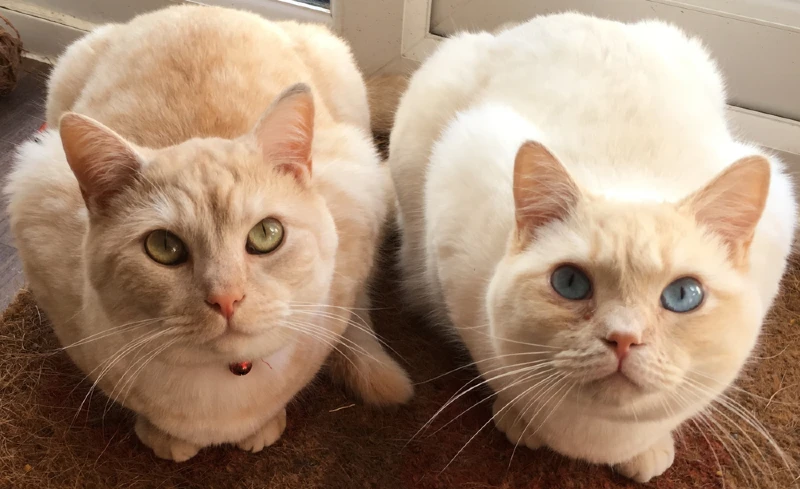Can Cats Smell Human Hormones? Which Ones & How It Works

Updated on

While cats are much smaller than many predators, they compensate for that with agility, flexibility, and wits. Heightened senses are another powerful tool in a feline’s arsenal. They can see in the dark, hear noises from afar, and identify the slightest odors. More than that, our four-legged buds can smell human hormones. That’s right: they can recognize elevated levels of estrogen, HCG, and other chemicals.
How is that possible, though? Can a cat tell if a person’s sick or in a bad mood? Will it be able to detect a pregnancy, menstrual cycle, or release of pheromones? Join us, and let’s talk about the most common hormonal changes that furballs easily spot and react to!
What Is a Hormone? Breaking It Down
A hormone is a chemical substance, a compound secreted by glands, organs, and tissues.1 Once the hormones are released into the bloodstream, they circulate through the veins to deliver very specific “commands” to different parts of the body. The effects don’t kick in immediately, though. Hormones work slowly yet have a huge impact on various processes.
Mainly, we’re talking about growth, metabolism, blood pressure, and the sleep-wake cycle, along with overall development and functions. More importantly, hormonal fluctuations alter the natural odors of the body, and that’s exactly what cats detect. It’s the smell that gives off the changes, not the actual shifts in the level of reproductive/other types of hormones.

Odors & Hormone Levels: How Do Cats Detect Them?
Did you know that kitties have 45–200 million odor sensors?2 To put things into perspective, we only have 5–10 million of those. More than that, the sense of smell of the average cat is approximately 9–16 times better than what a human male or female is born with. That’s quite a difference! In contrast, cats have a low number of taste buds: 473 versus 2–4,000 in an adult human.
So, it shouldn’t come as a surprise why felines mostly rely on their olfaction, hearing, and sight to experience the world. And, since our hormones are mostly released into the atmosphere through sweat, it doesn’t take much effort to detect them. The same goes for the pheromones.
Which Human Hormones Can Felines Smell/Identify?
Alright, now that we know for sure that cats do, indeed, have an amazing sense of smell, here’s a quick look at common hormones that they can detect:
- Menstrual Cycle Hormones. When a woman’s body goes through a menstrual cycle, it produces a series of hormones like LH and FSH that slightly alter that woman’s scent. And felines have the ability to detect those small changes. Thus, if your cat is sniffing you more than usual, chances are, it knows that you’re on a period.
- Pregnancy Hormones. Much like the menstrual cycle, pregnancy leads to the secretion of several hormones in the female body, mainly estrogen, progesterone, and HCG. Your furry companion will definitely notice that. Some experts even go as far as to claim that cats can tell a woman’s pregnant before she does!
- Pheromones. The main job of pheromones released by a human is to catch the attention of another person. In simple words, pheromones are secreted by men and women to sexually attract each other. Now, these substances are only intended for individuals of the same species. However, cats can easily detect pheromones released by their pet parents.
- Testosterone Levels. Cats are quick to detect a drop or spike in testosterone levels in other furballs. So, when a boy is neutered, fellow kitties will instantly know that. That said, there’s no scientific proof that cats can smell testosterone in human males. Also, it’s believed that our pets can’t differentiate between human males and females.

How Do Cats Handle This Information?
Have you ever felt like your furry bud somehow knows that you’re upset? Well, that’s because it absolutely does! When we’re having a hard time dealing with life stuff or experiencing pain, cats can detect that through fluctuations in hormone levels. The scent receptors of a human can’t do that, which is why we are clueless about the hormonal changes in our own bodies.
So, a cat that has a strong bond with its owner and is familiar with their “normal” smells will immediately start sniffing them out. You might think that the kitty is trying to comfort you, but most likely, it’s a sign of curiosity. This happens all the time when cats discover new scents, especially ones coming from humans they know. And here’s how cats react to various human emotions and behaviors:
- Being Scared. Just like dogs, felines can “smell” fear because they know when your body releases high doses of adrenaline. And by “felines”, we also mean tigers, panthers, and lions! These beasts will immediately use that to their advantage and (hopefully not) attach you. Thankfully, that’s not the case with cats. When you’re afraid of something, your furry friend will either get anxious or run away and hide.
- Being Sad. When we cry, tear ducts release a specific type of hormone that instantly grabs a cat’s attention. Our bodies also produce and “sprinkle” hormones when we’re stressed or anxious, which also serves as a magnate for the four-legged family members. That’s why cats often lose interest in a sad person the second they stop crying. You might get an encouraging head bump, but that’s about it.
- Being Happy. Cats love cheerful people! When we’re feeling great, our bodies release the “good” hormones that felines like to be around. We’re talking about endorphins, of course, and kitties won’t miss a chance to be in the company of a joyful human. So, the key takeaway here is—a happy owner equals a happy cat!
Do Cats Really Understand What’s Going On?
If we’re talking about complex matters like the menstrual cycle or pregnancy, then the answer is no. Cats have no way of knowing exactly what’s causing the fluctuations in hormone levels. Think of it this way: it’s a foreign concept to felines, yet they do have the ability to recognize the changes. So, the increased attention to your body will be caused by the cat’s desire to figure out what’s going on.
Now, cats aren’t as upfront with how they show affection compared to dogs and some other pets. At the same time, if a feline is purring at you, grooming (like licking your body), butting its head, or following you around the house, those could very well be signs of affection. But they won’t necessarily be triggered by hormones.

Final Thoughts
Cats are truly fascinating creatures. They are not only capable of making us smile, laugh, and appreciate life more, but they can also detect the slightest changes in our hormone levels. Cats have a sense of smell that’s vastly superior to what we, humans, are equipped with. It allows them to “sniff out” pheromones, pregnancies, and mood swings.
Therefore, don’t be surprised if the furry member of your family has been treating you a bit differently lately. Chances are, it knows that you’re dealing with a disease or just going through a rough patch that’s affecting your mood. So, do your best to return the favor by taking care of your cat, keeping it safe, and staying in sync!
- You Might Also Be Interested In: How Cats Endocrine Systems Work: Vet-Reviewed Facts
Featured Image Credit: evrymmnt, Shutterstock










